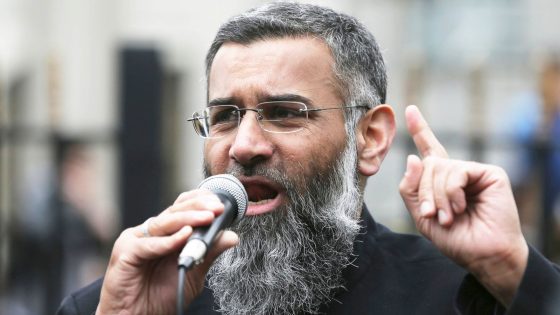Anjem Choudary, the notorious Islamist preacher, is facing life in jail after he was found guilty of directing a terrorist organisation following an unprecedented joint investigation by MI5, Scotland Yard, the New York Police Department, and Canadian police.
Choudary, 57, was released early from a five-year sentence for inviting support for ISIS in October 2018 but his licence conditions prevented him from using the internet until July 2021.
Within days of the conditions expiring, he began issuing press releases on Whatsapp and Telegram from his home in Ilford, East London.
He stood in the dock in a white t-shirt with his arms folded as he was found guilty at Woolwich Crown Court of directing a terrorist organisation and encouraging support for a proscribed organisation.
In a year he delivered more than 40 lectures, some to a small, selected circle but others with an audience of up to 150 from as far away as Brazil and Afghanistan.
It can be revealed that police in Britain, the US, and Canada had been running separate investigations as they became concerned that Choudary was seeking to recruit a new generation of younger followers.
Deputy Commissioner Rebecca Weiner from the New York Police Department (NYPD), called Choudary a “shamelessly prolific radicaliser” and added: “The names may have changed, years passed, but the threat remained.”
Read more from Sky News
Ruling in Clapham chemical attacker inquest
Ex-Little Mix singer’s niece reported missing
Fundraiser for girl orphaned by A61 crash
He began preaching online to a small group of associates in New York, called the Islamic Thinkers’ Society (ITS), in June 2022 which had been infiltrated by two US undercover law enforcement officers who recorded his speeches.
In one, he boasted that he had been labelled “the number one radicaliser in Britain,” adding: “That is a badge of honour for me. It’s a medallion on my chest. What do you want to call me? An extremist? Fanatic? All of these.”
Khalid Hussein, 29, a member of the Islamic Thinkers Society living in Edmonton, Canada, began an online magazine called al-Aseer, (the prisoners), and described to Canadian undercover officers how he was “working with Sheikh Anjem”, adding: “We are the remnants of al-Muhajiroun.”
Continued to run terror group
British prosecutors had to prove that Choudary had continued to run al-Muhajiroun (ALM), when the group’s spiritual leader, Omar Bakri Muhammad, fled to Lebanon after the July 7 London bombings in 2005.
Choudary helped set up the group in 1996, which re-appeared under numerous other names in an attempt to circumvent anti-terrorism laws, including Islam4UK and Muslims Against Crusades.
Choudary had been linked to numerous terrorists, including both Michael Adebolajo, the killer of Fusilier Lee Rigby, and Khuram Butt, the leader of the London Bridge attacks.
During his trial, Choudary admitted that he had performed a wedding ceremony for Adebolajo and had been present when he converted to Islam.
Two American undercover officers, referred to as OP488 and OP377, flew to London to give evidence and described how they joined a video conference call using the Element messenger platform on 12 June 2022.
A member of ITS using the name Abu Hamza, told Choudary: “We’re not banned or anything, we could go back to the old name al-Muhajiroun.”
Choudary said “fantastic” but then added: “The name is not important anyway.”
He boasted that no one had ever been prosecuted for being a member of al-Muhajiroun and spoke of how “many people became shaheed alhamdulillah” (martyrs, praise god).
In a lecture on 17 July 2022, Choudary urged his followers: “Remember the good times my dear brothers, never forget who you are, remember the Lion King when he said, remember who you are.”
In one lecture on 26 February last year, Choudary told his audience: “Is terrorism part of the deen (faith)? Yes even more, horrifying is part of the deen, even to horrify the people.”
Choudary was also caught joking about trying to charge the media £9.11 to enter a press conference on the anniversary of the 11 September attacks and naming a hurricane after Osama bin Laden.
MI5 bugged London home
MI5 had bugged Choudary’s home and the release of Bakri, after nine years in jail in Lebanon, produced a key piece of intelligence.
On 30 April last year, the covert listening devices picked up Choudary updating Bakri on the members who had become “martyrs” and sending him the phone numbers for the “old timers.”
He described how he had continued his activity online and spoke about his role as Bakri’s “naqib” (deputy) and how he had taken on the role of the “caretaker emir” (leader) when Bakri had been jailed in May 2014.
Choudary was arrested when Khalid Hussein arrived from Canada to visit him on 17 July last year.
He stood in the dock in a white t-shirt with his arms folded as he was found guilty of directing a terrorist organisation and encouraging support for a proscribed organisation.
Hussein was also found guilty of being a member of a proscribed organisation.
Speaking in his defence, Choudary claimed al-Muhajiroun had been disbanded in 2004 but added: “It is the Kevin Keegan effect. If you ask people about Kevin Keegan, people say he played football for Liverpool. They look at me as al-Muhajiroun.”
However, Tom Little KC, prosecuting, told the jury at Woolwich Crown Court: “Leopards don’t change their spots and Anjem Choudary has not changed his mindset.”
Choudary’s message to those attending his lectures “would be clearly understood by them. It was not legitimate religious freedom of expression and it was not peaceful,” the prosecutor added.
Commander Dominic Murphy, the head of Scotland Yard’s Counter-Terrorism Command, said: “This was a truly transnational terrorist investigation and that rarity has an awful lot to do with the significance of the case.”
Had numbers of London Bridge attackers – among others
Over nearly 30 years, Anjem Choudary lived off benefits as he advocated for violent Jihad, labelled fellow Muslims as apostates for voting, and promoted the establishment of an Islamic state in Britain.
He promised followers “free food, clothing, and shelter” under an Islamic state adding: “You don’t have electricity? Here is free electricity. Here is free water. What else do you want? Do you want a salary? Here, take some money. There is no society like that.”
Choudary regularly grabbed the headlines with stunts that included celebrations of 11 September attacks, threats to picket soldiers’ funerals, and burning poppies on Remembrance Day.
He was also linked to numerous terrorists, dating back to a group arrested in Crawley, West Sussex in March 2004 who were planning to blow up the Ministry of Sound nightclub using half a ton of ammonium nitrate and who had links to the 7 July 2005 bombers.
The jury was not aware that Khuram Butt, the leader of the attackers who killed eight people at London Bridge and Borough Market in June 2017, was said to be “like a lion out of a cage” after meeting Choudary at his home.
Usman Khan, who killed two Cambridge students at a prisoners’ conference at Fishmongers’ Hall in November 2019 was another follower who had Choudary’s number on his mobile phone when he was jailed in 2010.
After Choudary endorsed ISIS, large numbers of his associates travelled to Syria, including Siddhartha Dhar, a key lieutenant who appeared in an ISIS execution video in January 2016, shooting a prisoner in the back of the head.
ALM also opened up branches abroad including Shariah4Belgium, which was said to have played a role in radicalising the Paris attackers who killed 130 people in November 2015.
In the US, almost a dozen members or associates of the Islamic Thinkers’ Society were convicted of support for terrorism and a former member called Samir Khan moved to Yemen from where he ran a notorious online magazine for al-Qaeda called Inspire, designed to encourage lone actor attacks in the West.
In a bugged conversation with his wife, Rubina Akhtar on 22 March last year, Choudary said: “That impact is there – al-Muhajiroun has gone down in history and that’s why they say 40% of all things associated with us. The impact was phenomenal, global.”
By 18 August 2021, a month after Anjem Choudary’s licence conditions were dropped, he had 715 subscribers to his Telegram channel, which was called “A Call to Islam”.
It reused the name of a group which Khalid Masood, the convert who killed PC Keith Palmer and four others in Westminster in 2017, had been involved in.
The Telegram group was shut down on 20 August but Choudary opened a series of alternatives, distributing new links on WhatsApp.
Muhammad Hamzah Heyder Khan, a 17 year old from Birmingham, was arrested in November 2022 on suspicion of trying to join ISIS in Afghanistan, and investigators discovered that he had received advice over WhatsApp from Choudary on how to avoid checks on his phone when he left the country.
Heyder Khan had also asked Choudary if a Muslim running in the local elections was an apostate – for which the penalty is death.
Choudary sent him the different Islamic verdicts on people who stand for elections and told him to “check this out and see where he falls”, adding: “You can decide.”
In a lecture on 19 February last year, Choudary mentioned that he had been approached by two 14 year olds on the gaming and messaging app, Discord.
“I feel like a grandfather definitely,” Choudary said. “I’m not going to put them down in any way. They want the haqq (the truth) brother I’m going to give it to them. You just have to be a bit careful.”
‘Worrying’ increase in teenage boy terrorists
Commander Dominic Murphy, the head of Scotland Yard’s Counter-Terrorism Command, said it was “deeply worrying” that they were “seeing an increasingly large number of young people, particularly young teenage boys being part of terrorist investigations”.
“Voices like Anjem Choudary and the reach of those online environments and secure apps, make it much, much easier to have an impact on younger people than we might have seen several years ago when we first started investigating Choudary,” he added.
“What became clear at the end of his licence conditions is that he sought to use the online space to engage globally with larger groups of people and increasingly there were larger numbers of people prepared to engage with him.
Deputy Commissioner Rebecca Weiner from the New York Police Department (NYPD), said: “Usually it is the footsoldiers who are brought to justice or go on to commit the attack and it’s rarely the leaders, which is what makes this a particularly important moment.”
DC Weiner said investigators had found it “somewhat surprising to see that this older generation still had sway and hold over younger kids”.
“Some of these online lectures were quite small and intimate but many of them were large with hundreds of people and there you have the power of technology,” she added.
Choudary had established a “transatlantic reach which was very powerful” highlighting to police the “borderless nature of the threat” and demanding a borderless response, Weiner said.
Source Agencies





![Abu Hafs (left) and Abu Saif [aka Usman Khan] (right), who spoke alongside Anjem Choudary (centre) at a conference on Sharia law organised by Ahl Sunnah Wal Jumah at Cobridge Community Centre in Stoke-on-Trent, Staffordshire in 2009](https://e3.365dm.com/19/12/768x432/skynews-abu-hafs-abu-saif-usman-khan_4855308.jpg?20191203125517)

